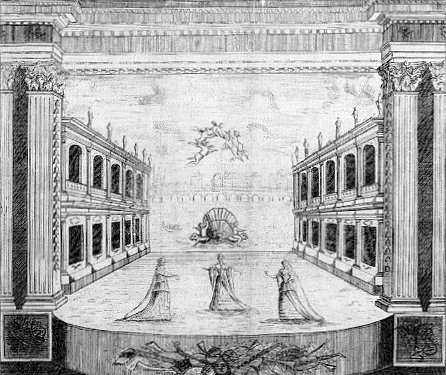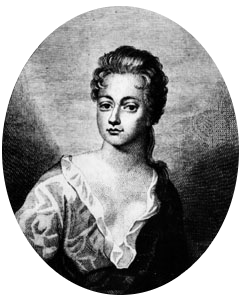

“The good-looking, melodious-voiced William Mountfort played both tragic and comic lovers to perfection, and was mourned by theatergoers and colleagues alike when he died, the innocent victim of a swordfight over Mrs. Bracegirdle.”
 I came across that sentence in a history of the English theater. That was it. No further explanation.
I came across that sentence in a history of the English theater. That was it. No further explanation.
Now I ask you, is it not fiendish to drop in a tantalizing statement like that and not give any further details or explanations? I had to find out the rest of the story.
It was a sad one, with only four principal players.
In 1692, William Mountfort had been on the London stage for about 10 years and had written three plays himself. He was at his best as the fop, the lover, or the rake, often playing opposite his wife, Susanna, or Anne Bracegirdle.
Anne Bracegirdle was not an extraordinary beauty, but her liveliness and vivacity made her extremely popular, especially in breeches roles, where she could show off her legs. She was also known throughout her career for her virtue—unexpected in an actress—and at the time of the tragedy she was a young girl living sedately with her mother.
Charles, the 4th Baron Mohun, had inherited his title as an infant when his father was killed in a duel. He was known as a rake and a duelist, and no one seems to have had much of anything good to say about him.
Captain Richard Hill had served in the army for about four years and was, at this time, living in London, where he had become wildly infatuated with Mrs. Bracegirdle. (All actresses were called Mrs. It had nothing to do with their marital status.)
In 1692 the theater was the fashionable place to go for young men, some of whom even watched the play. Lord Mohun was as fascinated as the next lord, and liked to talk and dine with the actors. He seems to have particularly liked Mountfort, who treated him with more kindness and courtesy than some of the other actors. However, his friend Captain Hill had very different feelings.
Hill had a passion for Mrs. Bracegirdle, but she wanted nothing to do with him. He persisted in pressing his attentions, and she persisted in scorning him. Hill must have had difficulty distinguishing between the theater and real life because he concluded that his rival was Mountfort, who often played Mrs. Bracegirdle’s lover on stage.
After weeks of telling everyone in sight how much he hated Mountfort and threatening to kill the actor, Hill decided to kidnap Anne. He enlisted Mohun’s aid, hired a coach, and gathered a bunch of thugs. They waylaid Anne on her way home with a group of friends, including her mother.
It did not go as planned. Anne screamed and clung to her mother, who also screamed and clung to Anne. The friends all shouted. People came pouring out to see what was going on and to drive off the would-be kidnappers. Mohun sat inside the coach and watched.
Anne and her mother got home safely, and Hill and Mohun followed them. Hill sent in messages asking her to please come out so he could apologize. Mohun explained that his friend had only wanted to take her away for a week or so to convince her to marry him. Anne said that even if Hill crawled on his knees to her she wouldn’t forgive him.
That left Hill and Mohun out in the street, with Hill waving his sword around because he had lost the scabbard in the scuffle at the coach. They had had quite a bit to drink already, and over the next hour or two had quite a bit more. Hill was convinced that Mountfort was the  reason it had all gone wrong and vowed to get his revenge.
reason it had all gone wrong and vowed to get his revenge.
Unfortunately Mountfort came walking down the street. He saw them and, ignoring Hill, said to Mohun that he ought to keep better company. In a fury, Hill ran his sword through the actor. Mountfort drew his own sword, but soon fell before Hill’s onslaught.
While Hill ran off, eventually getting to France, Mountfort was helped to his own house, where he died. Mohun remained in the street and was arrested.
The trial was, of course, a sensation. A nobleman being tried for murder in the House of Lords—the news and the rumors were flying. Mohun’s defense was that he had not known that Hill meant it when he was threatening to kill Mountfort, and he hadn’t himself actually done anything. Some witnesses said he had held Mountfort while Hill struck but others said no. At any rate the Lords acquitted him by a vote of 69 to 14. Not everyone thought that justice had been served.
What was left out of that recounting was the ages of the actors. Mountfort at 27 or 28 was the oldest, and the only adult. Anne Bracegirdle, whose age is always uncertain, was probably between 17 and 21. Hill was about 20, and Mohun only 15. Adolescent self-dramatization, combined with large amounts of alcohol, had predictably disastrous results.
It would be nice if we could say that, sobered by this encounter with tragedy, Hill and Mohun amended their lives and became responsible citizens. But it seems that rakes only reform in fiction. Hill returned to the army and eventually won a pardon for his foreign service. It is said that he died in a drunken tavern brawl. Mohun went on to fight a number of duels and, like his father, died in one. Mohun and the Duke of Hamilton had been involved in a lengthy dispute over an inheritance, and when it seemed his case was going badly, Mohun challenged the duke to a duel. Both men died, Mohun killed by the duke and the duke killed by Mohun’s second.
Mrs. Bracegirdle became one of the most famous actresses of her age and died honored and respected in 1748. She is buried in Westminster Abbey.
Source:
The Life and Death of William Mountfort by Albert S. Borgman

Comments
What an incredibly tragic
What an incredibly tragic story! I wish I could rewrite it to see Hill got what he deserved. Great bit of history - I'm glad you didn't stop at the teaser but researched and shared this with us.
Captain Richard Hill
Richard Hill didn't die in a drunken brawl. He died in Carlow in 1747 and was buried in Kilkenny. He married in the late 1690's and had many children. He also served in the British army with distinction and was rewarded for this service with a pardon for the murder. He became a magistrate in Henblas in Wales before he returned to Ireland
Thank you for the update. Can
Thank you for the update. Can you point me to your sources? I didn't delve too deeply into this and I'm afraid the books I found were not entirely scholarly.
Richard Hill
Gerald Morgan, 1997, A Welsh House and its Family - The Vaughans of Trawsgoed
Notes and Queries article by E. E. Hill of Maycliff, St. Luke’s Road North, Torquay in the 15th August 1914 edition headed “Capt. Richard Hill and the Siege of Derry”
http://www.irishgenealogy.ie/index.html
De Mohun Family.
Lord De Mohun is my great grandfather. So strange people writing about your ancestors.
Ancestors
It must feel strange! When I'm researching things I sometimes forget that these people aren't characters in a book and often do have descendants in the "real" world.
Post new comment